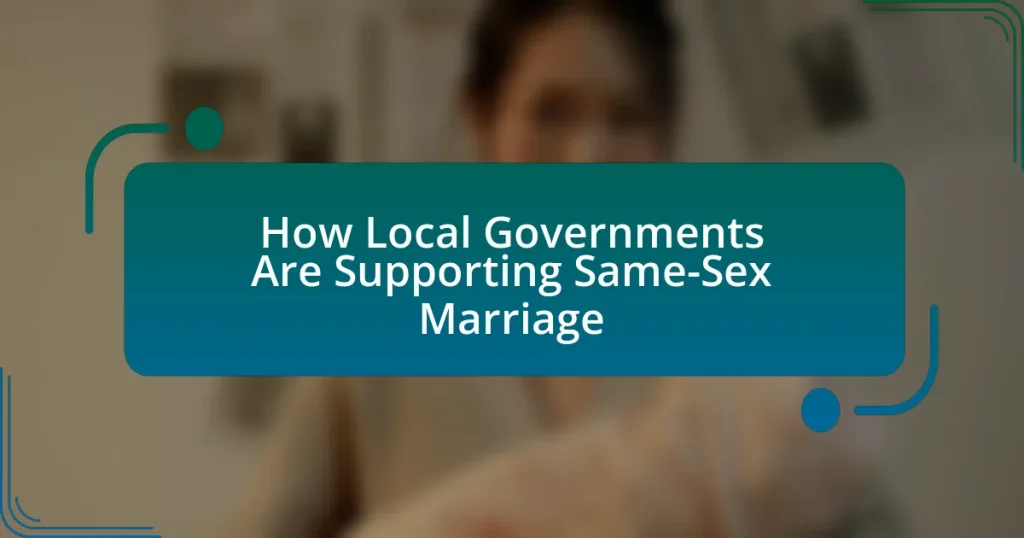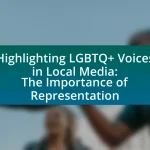Local governments play a vital role in supporting same-sex marriage through the enactment of inclusive policies and the issuance of marriage licenses to same-sex couples. They implement anti-discrimination ordinances, provide training on LGBTQ+ inclusivity, and engage in community outreach to foster acceptance. Local officials advocate for marriage equality, influencing public perception and legal frameworks, while also facing challenges such as legal restrictions and community opposition. The support from local governments not only enhances legal recognition of same-sex marriages but also contributes to broader societal acceptance and positive outcomes for LGBTQ+ individuals.
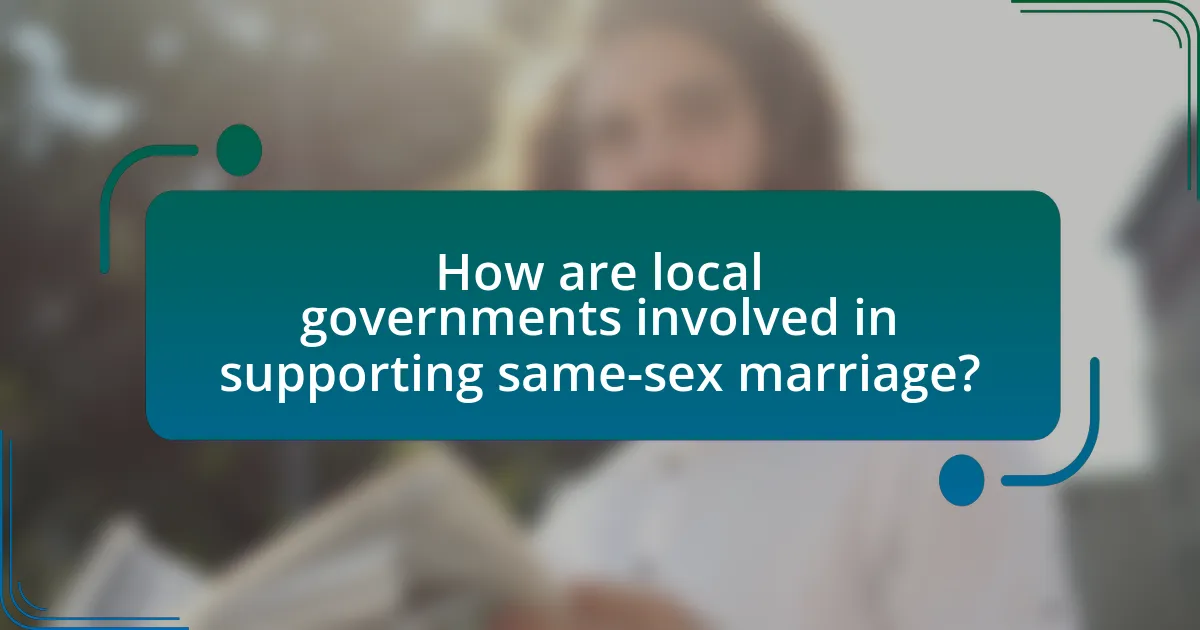
How are local governments involved in supporting same-sex marriage?
Local governments support same-sex marriage by enacting policies that promote equality and inclusivity. They often provide marriage licenses to same-sex couples, ensuring compliance with state and federal laws that recognize such unions. Additionally, local governments may implement anti-discrimination ordinances that protect LGBTQ+ individuals in various sectors, including housing and employment. For instance, cities like San Francisco and New York have established programs to educate the public about LGBTQ+ rights and provide resources for same-sex couples. These actions demonstrate a commitment to fostering an environment where same-sex marriage is recognized and supported at the community level.
What specific actions are local governments taking to support same-sex marriage?
Local governments are implementing various actions to support same-sex marriage, including issuing marriage licenses to same-sex couples, providing training for staff on LGBTQ+ inclusivity, and enacting local ordinances that protect against discrimination based on sexual orientation. For instance, cities like San Francisco and New York have established programs to ensure equal access to marriage services and have publicly affirmed their commitment to LGBTQ+ rights through resolutions and public statements. Additionally, local governments are often involved in community outreach and education initiatives aimed at fostering acceptance and understanding of same-sex marriage within their jurisdictions.
How do local ordinances promote same-sex marriage rights?
Local ordinances promote same-sex marriage rights by establishing legal frameworks that recognize and protect these unions at the municipal level. For instance, many cities have enacted ordinances that provide equal access to marriage licenses for same-sex couples, ensuring they receive the same legal recognition and benefits as heterosexual couples. Additionally, local governments may implement anti-discrimination policies that safeguard the rights of same-sex couples in various areas, such as housing and employment, further supporting their marriage rights. These local measures often serve as a foundation for broader state and national legal changes, as seen in jurisdictions where local ordinances have paved the way for statewide legalization of same-sex marriage.
What role do local government officials play in advocating for same-sex marriage?
Local government officials play a crucial role in advocating for same-sex marriage by implementing policies, issuing marriage licenses, and promoting inclusivity within their communities. These officials can influence public opinion and legislative changes through local ordinances and public statements that support LGBTQ+ rights. For instance, many may participate in Pride events or create initiatives that foster acceptance, thereby reinforcing the legal and social framework necessary for same-sex marriage. Their advocacy is often supported by data showing increased public support for same-sex marriage, as evidenced by a 2021 Gallup poll indicating that 70% of Americans favor legalizing same-sex marriage, reflecting a shift in societal attitudes that local officials can harness to drive change.
Why is local government support important for same-sex marriage?
Local government support is crucial for same-sex marriage because it facilitates the implementation of inclusive policies and legal recognition at the community level. Local governments often have the authority to issue marriage licenses, which directly impacts the ability of same-sex couples to marry. For instance, in 2015, following the Supreme Court’s decision in Obergefell v. Hodges, many local governments quickly adapted their policies to ensure compliance, demonstrating the significant role they play in the immediate accessibility of marriage rights. Additionally, local government support can foster a more accepting social environment, as municipalities that openly endorse same-sex marriage contribute to broader societal acceptance and equality.
How does local support influence public perception of same-sex marriage?
Local support significantly enhances public perception of same-sex marriage by fostering acceptance and normalizing LGBTQ+ relationships within communities. When local governments and organizations openly endorse same-sex marriage, it creates a visible framework of support that influences individual attitudes. For instance, studies have shown that regions with pro-same-sex marriage policies experience higher levels of public approval, as seen in the 2015 Pew Research Center survey, which indicated that public support for same-sex marriage increased in states that had legalized it compared to those that had not. This correlation suggests that local endorsement not only legitimizes same-sex relationships but also encourages dialogue and reduces stigma, ultimately shaping a more positive public perception.
What impact does local government support have on the legal landscape for same-sex marriage?
Local government support significantly influences the legal landscape for same-sex marriage by fostering an environment that promotes equality and acceptance. When local governments enact policies that recognize and support same-sex marriage, they contribute to a broader societal shift towards inclusivity, which can lead to changes at the state and federal levels. For instance, cities like San Francisco and New York have implemented measures that not only recognize same-sex marriages but also provide resources and protections for LGBTQ+ individuals, thereby setting precedents that challenge discriminatory laws. This local advocacy has been instrumental in shaping public opinion and legal frameworks, ultimately culminating in landmark rulings such as the U.S. Supreme Court’s decision in Obergefell v. Hodges, which legalized same-sex marriage nationwide in 2015.
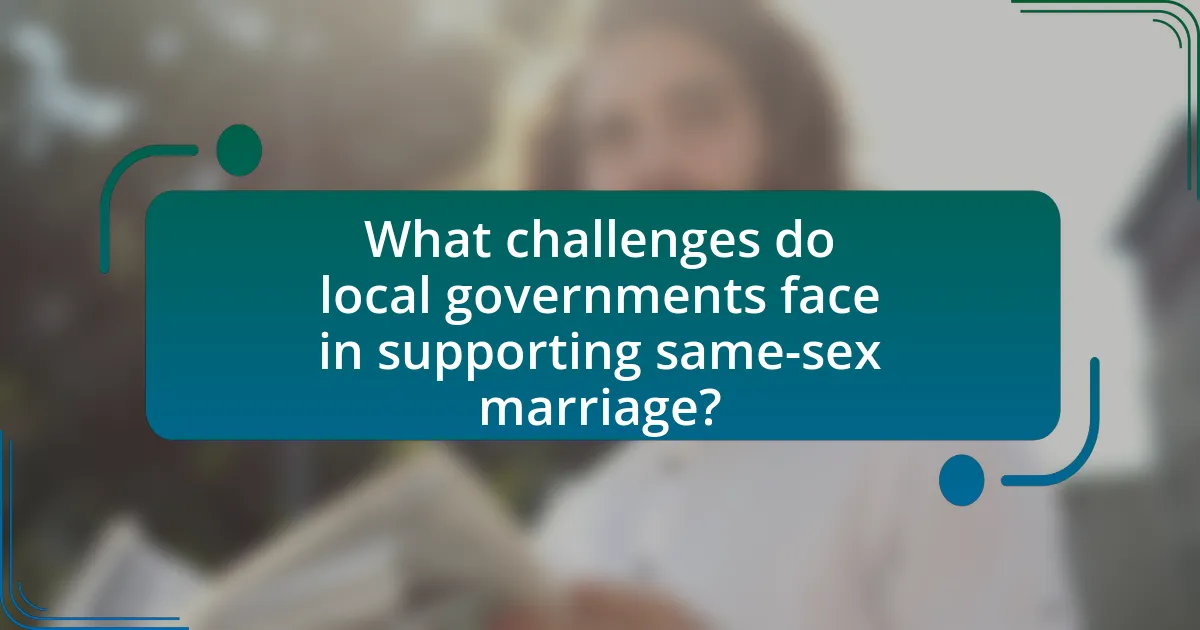
What challenges do local governments face in supporting same-sex marriage?
Local governments face several challenges in supporting same-sex marriage, primarily stemming from legal, political, and social factors. Legal challenges arise from varying state laws and regulations that may not recognize same-sex marriage, creating inconsistencies in how local governments can implement supportive measures. Politically, local officials may encounter opposition from constituents or political groups that oppose same-sex marriage, which can hinder their ability to advocate for inclusive policies. Socially, local governments may face backlash or discrimination from segments of the community, complicating efforts to promote acceptance and equality. These challenges are evident in states where local governments have attempted to enact supportive measures but faced legal pushback or public protests, highlighting the complex landscape surrounding the issue.
What legal obstacles do local governments encounter?
Local governments encounter legal obstacles such as conflicting state laws, limitations imposed by federal regulations, and challenges related to local ordinances. For instance, some states have laws that restrict local governments from recognizing same-sex marriages, creating a legal conflict for municipalities that wish to support marriage equality. Additionally, federal regulations may not align with local policies, complicating the implementation of supportive measures. These obstacles can hinder local governments’ ability to fully advocate for and implement policies that promote same-sex marriage rights.
How do state laws affect local government actions on same-sex marriage?
State laws significantly influence local government actions on same-sex marriage by establishing the legal framework within which local jurisdictions operate. For instance, if a state legalizes same-sex marriage, local governments are empowered to issue marriage licenses to same-sex couples, thereby facilitating their access to marriage rights. Conversely, if a state enacts laws prohibiting same-sex marriage, local governments may be restricted from recognizing or performing such marriages, regardless of local public support. This dynamic was evident in the 2015 Supreme Court case Obergefell v. Hodges, which mandated that all states must allow same-sex marriage, thus overriding any state laws that previously restricted it.
What are the implications of federal rulings on local government support?
Federal rulings significantly influence local government support by establishing legal precedents that local entities must follow. For instance, the Supreme Court’s decision in Obergefell v. Hodges (2015) legalized same-sex marriage nationwide, compelling local governments to recognize and support same-sex marriages, thereby ensuring equal treatment under the law. This ruling not only mandates compliance but also encourages local governments to implement policies and programs that promote inclusivity and equality, reflecting the federal government’s stance on civil rights. Consequently, local governments may allocate resources to support same-sex marriage initiatives, such as public awareness campaigns and legal assistance, aligning their practices with federal mandates.
How do community attitudes impact local government support for same-sex marriage?
Community attitudes significantly influence local government support for same-sex marriage by shaping the political climate and decision-making processes. When a community exhibits positive attitudes towards same-sex marriage, local governments are more likely to align their policies and support initiatives that promote equality, as seen in regions where public opinion polls indicate strong support for LGBTQ+ rights. For instance, a 2020 Gallup poll revealed that 70% of Americans supported same-sex marriage, correlating with increased legislative actions in favor of marriage equality at local levels. Conversely, negative community attitudes can lead to resistance from local officials, resulting in a lack of support for same-sex marriage initiatives. This dynamic illustrates how local government actions are often a reflection of the prevailing sentiments within their communities.
What strategies do local governments use to address opposition from constituents?
Local governments employ several strategies to address opposition from constituents regarding same-sex marriage. These strategies include engaging in community outreach, facilitating public forums, and providing educational resources to clarify misconceptions about same-sex marriage. For instance, local governments often organize town hall meetings to allow constituents to voice their concerns and ask questions, fostering a dialogue that can reduce opposition. Additionally, they may collaborate with advocacy groups to disseminate information that highlights the benefits of same-sex marriage, such as promoting equality and enhancing community cohesion. Evidence of these strategies can be seen in various municipalities that have successfully increased public support for same-sex marriage through proactive engagement and education initiatives.
How can local governments foster a more inclusive environment for same-sex marriage?
Local governments can foster a more inclusive environment for same-sex marriage by implementing policies that promote equality and awareness. For instance, local governments can establish non-discrimination ordinances that protect LGBTQ+ individuals from discrimination in housing, employment, and public services. Research from the Williams Institute indicates that such policies significantly improve the well-being of LGBTQ+ individuals and increase their access to marriage services. Additionally, local governments can provide educational programs that raise awareness about same-sex marriage rights and the importance of inclusivity, which can help reduce stigma and promote acceptance within the community. By actively engaging in these initiatives, local governments can create a supportive atmosphere that encourages same-sex marriage and fosters equality.
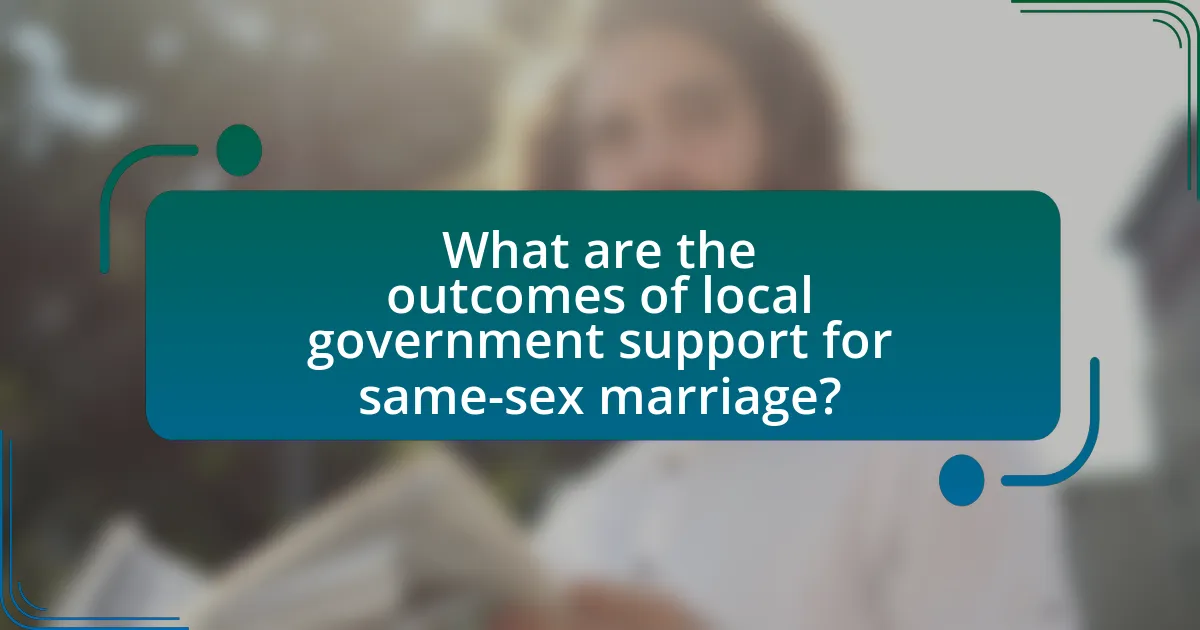
What are the outcomes of local government support for same-sex marriage?
Local government support for same-sex marriage leads to increased legal recognition and social acceptance of LGBTQ+ relationships. This support often results in the implementation of inclusive policies, such as non-discrimination laws and the provision of marriage licenses, which enhance the rights and protections for same-sex couples. For instance, studies have shown that areas with local government endorsement of same-sex marriage experience a decrease in anti-LGBTQ+ hate crimes and an increase in mental health outcomes among LGBTQ+ individuals, as reported by the Williams Institute in 2019. Furthermore, local government support can stimulate economic benefits through increased tourism and wedding-related spending, as evidenced by research from the American Civil Liberties Union, which highlights the positive economic impact in regions that embrace marriage equality.
How has local government support changed the landscape for same-sex marriage?
Local government support has significantly transformed the landscape for same-sex marriage by facilitating legal recognition and promoting inclusive policies. For instance, many local governments have enacted ordinances that allow same-sex couples to obtain marriage licenses, which has contributed to a broader acceptance of same-sex marriage within communities. Additionally, local governments often provide resources and support for LGBTQ+ advocacy groups, enhancing visibility and fostering public dialogue. This shift is evidenced by the increase in municipalities that have adopted pro-LGBTQ+ policies, such as non-discrimination laws and public awareness campaigns, which collectively create a more supportive environment for same-sex marriage.
What successes have local governments achieved in promoting same-sex marriage?
Local governments have achieved significant successes in promoting same-sex marriage by implementing inclusive policies and facilitating legal recognition. For instance, cities like San Francisco and New York have led initiatives to provide marriage licenses to same-sex couples, effectively challenging discriminatory laws. Additionally, local governments have organized public awareness campaigns that educate citizens about LGBTQ+ rights, contributing to increased acceptance and support for same-sex marriage. These efforts have resulted in measurable outcomes, such as the rise in same-sex marriage rates in jurisdictions that actively promote these policies, demonstrating the effectiveness of local government actions in advancing marriage equality.
How do local government initiatives contribute to broader societal acceptance?
Local government initiatives contribute to broader societal acceptance by implementing policies that promote inclusivity and equality, particularly in the context of same-sex marriage. These initiatives, such as local ordinances supporting LGBTQ+ rights, public awareness campaigns, and community engagement programs, help normalize same-sex relationships within the community. For instance, cities that have adopted non-discrimination laws and provided resources for LGBTQ+ individuals have seen increased public support for same-sex marriage, as evidenced by a 2019 study from the Williams Institute, which found that local policies positively influence public attitudes towards LGBTQ+ rights. By fostering an environment of acceptance, local governments play a crucial role in shaping societal norms and attitudes.
What best practices can local governments adopt to enhance support for same-sex marriage?
Local governments can enhance support for same-sex marriage by implementing inclusive policies and community outreach programs. These policies should include non-discrimination ordinances that protect LGBTQ+ individuals in employment, housing, and public accommodations, which have been shown to foster a more accepting environment. Additionally, local governments can organize educational campaigns that promote awareness and understanding of same-sex marriage, thereby reducing stigma and misinformation. Research indicates that communities with active support initiatives see higher acceptance rates; for example, a study by the Williams Institute found that public support for same-sex marriage increased significantly in areas where local governments actively engaged in advocacy and education.
How can local governments effectively engage with LGBTQ+ communities?
Local governments can effectively engage with LGBTQ+ communities by implementing inclusive policies, fostering open dialogue, and providing targeted resources. Inclusive policies, such as non-discrimination ordinances and support for LGBTQ+ rights, create a welcoming environment. Open dialogue can be facilitated through community forums and partnerships with LGBTQ+ organizations, ensuring that the voices of community members are heard. Additionally, providing targeted resources, such as health services and legal assistance, addresses specific needs within the LGBTQ+ population. Research indicates that cities with active LGBTQ+ engagement strategies report higher levels of community satisfaction and trust in local government, demonstrating the effectiveness of these approaches.
What resources are available for local governments to support same-sex marriage initiatives?
Local governments can access various resources to support same-sex marriage initiatives, including legal guidance, funding opportunities, and community engagement programs. Organizations such as the Human Rights Campaign provide legal resources and advocacy tools specifically designed to assist local governments in implementing inclusive policies. Additionally, grants from foundations like the Arcus Foundation can help finance initiatives aimed at promoting equality and supporting LGBTQ+ communities. Furthermore, local governments can collaborate with LGBTQ+ advocacy groups to foster community support and awareness, ensuring that initiatives are effectively communicated and embraced.
